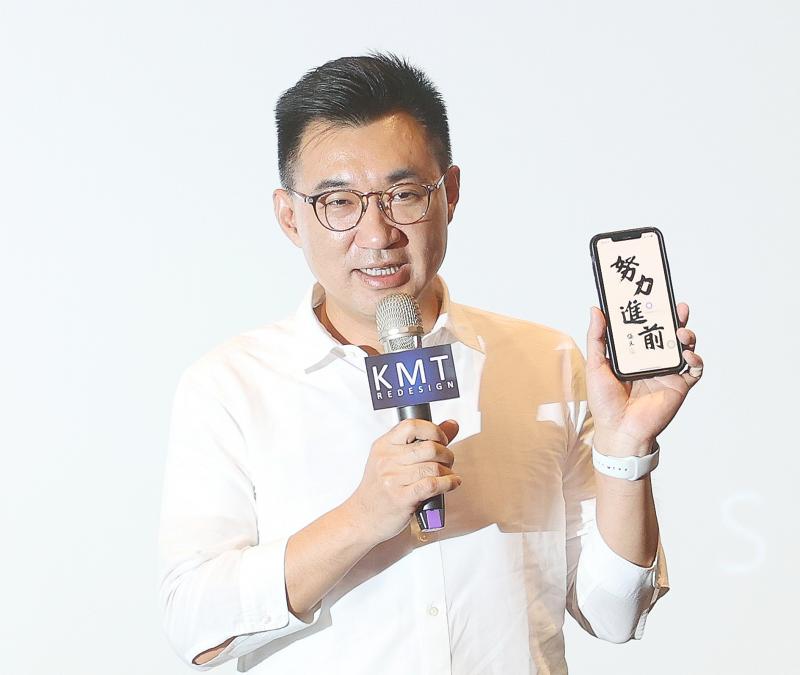The Chinese Nationalist Party (KMT) yesterday launched the party’s “digital chapter,” a mobile app that it says represents its willingness to “keep up with the times.”
The app’s functions allow KMT members to verify a membership card or pay fees, KMT Chairman Johnny Chiang (江啟臣) told a news conference in Taipei.
A map lets users find chapter locations and shops that offer discounts to party members, he said.

Photo: CNA
“More importantly, we can keep in touch with you,” Chiang said, adding that the party can use the app to update its members on party events and make announcements.
The app could also be used to conduct polls in real time to “understand the views of more party members and even non-party members,” he said.
People can also use the app to apply to join the party, he added.
“This is the digital age,” Chiang said. “If you cannot keep up with the digital age, prepare to be eliminated by it.”
Chiang said that he proposed the creation of a “digital chapter” in the run-up to the March 7 chairperson by-election, when he was campaigning for the position.
“We are the first political party to digitize,” he said.
The launch of the platform “represents that the KMT is willing to innovate, accept change and keep up with the times,” he said.
“In the past, everyone might have thought that the KMT was removed from the public and far away from its members,” said Chien Chin-yu (簡勤佑), who was appointed the party’s “chief digital marketing technology officer” in April.
The intent of the app is to address that distance, he added.
“This is just the beginning,” Chien said, adding that other functions are to be added to the app.
The “digital chapter” became available for download on Tuesday, the party said.
Asked whether the KMT’s proposed referendum on food safety means that it is taking an “anti-US” stance, Chiang said that “guarding food safety ... has nothing to do with being pro-US or anti-US. This is an issue of food safety — no need to politicize it.”
On Wednesday, Chiang said that the KMT planned to launch a referendum on food safety on Sunday in response to a decision by President Tsai Ing-wen’s (蔡英文) administration to ease restrictions on imports of US pork containing ractopamine and beef from cattle aged 30 months or older.
Additional reporting by CNA

A preclearance service to facilitate entry for people traveling to select airports in Japan would be available from Thursday next week to Feb. 25 at Taiwan Taoyuan International Airport, Taoyuan International Airport Corp (TIAC) said on Tuesday. The service was first made available to Taiwanese travelers throughout the winter vacation of 2024 and during the Lunar New Year holiday. In addition to flights to the Japanese cities of Hakodate, Asahikawa, Akita, Sendai, Niigata, Okayama, Takamatsu, Kumamoto and Kagoshima, the service would be available to travelers to Kobe and Oita. The service can be accessed by passengers of 15 flight routes operated by

GIVE AND TAKE: Blood demand continues to rise each year, while fewer young donors are available due to the nation’s falling birthrate, a doctor said Blood donors can redeem points earned from donations to obtain limited edition Formosan black bear travel mugs, the Kaohsiung Blood Center said yesterday, as it announced a goal of stocking 20,000 units of blood prior to the Lunar New Year. The last month of the lunar year is National Blood Donation Month, when local centers seek to stockpile blood for use during the Lunar New Year holiday. The blood demand in southern Taiwan — including Tainan and Kaohsiung, as well as Chiayi, Pingtung, Penghu and Taitung counties — is about 2,000 units per day, the center said. The donation campaign aims to boost

ENHANCING EFFICIENCY: The apron can accommodate 16 airplanes overnight at Taoyuan airport while work on the third runway continues, the transport minister said A new temporary overnight parking apron at Taiwan Taoyuan International Airport is to start operating on Friday next week to boost operational efficiency while the third runway is being constructed, the Ministry of Transportation and Communications said yesterday. The apron — one of the crucial projects in the construction of the third runway — can accommodate 16 aircraft overnight at the nation’s largest international airport, Minister of Transportation and Communications Chen Shih-kai (陳世凱) told reporters while inspecting the new facility yesterday morning. Aside from providing the airport operator with greater flexibility in aircraft parking during the third runway construction,

MORE FALL: An investigation into one of Xi’s key cronies, part of a broader ‘anti-corruption’ drive, indicates that he might have a deep distrust in the military, an expert said China’s latest military purge underscores systemic risks in its shift from collective leadership to sole rule under Chinese President Xi Jinping (習近平), and could disrupt its chain of command and military capabilities, a national security official said yesterday. If decisionmaking within the Chinese Communist Party has become “irrational” under one-man rule, the Taiwan Strait and the regional situation must be approached with extreme caution, given unforeseen risks, they added. The anonymous official made the remarks as China’s Central Military Commission Vice Chairman Zhang Youxia (張又俠) and Joint Staff Department Chief of Staff Liu Zhenli (劉振立) were reportedly being investigated for suspected “serious